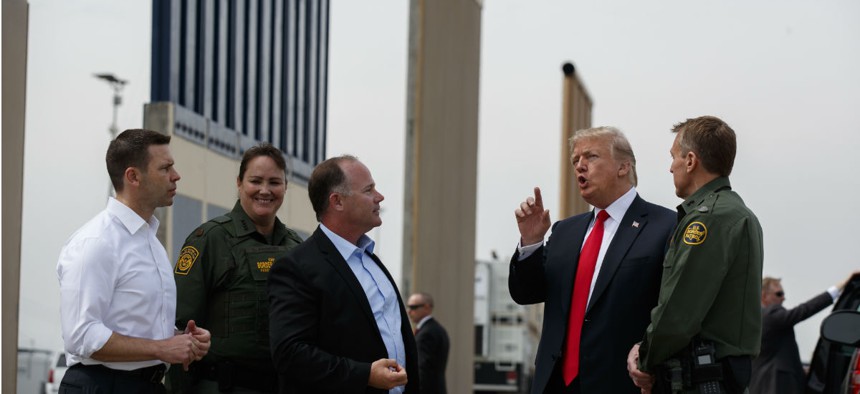Trump Administration Begins Probing Private Landowners Along Border Over Wall Construction
The administration is looking to spend $240 million for a company to assess real estate along the border.
The Trump administration has begun asking non-federal landholders along the U.S.-Mexico border for permission to survey their properties to assess the details of building a wall on them, ramping up the timeline for the White House’s signature issue.
Customs and Border Protection and the Army Corps of Engineers started sending letters in recent weeks to obtain “rights of entry for survey” for properties in Texas’ Rio Grande Valley. If consent is provided, the agencies will conduct environmental assessments, land surveys, appraisals and other activities to enable the construction of a “contiguous, physical wall,” according to information CPB provided to Sen. Claire McCaskill, D-Mo.
The assessments at this stage will only take place if the landowner agrees to grant CBP and ACE access. In some cases, the owners are already giving permission. The city council of Donna, Texas, approved CBP’s request during a recent meeting, according to The Monitor, a newspaper in the Rio Grande Valley.
McCaskill suggested that information the federal government learns during its surveys could later be used in an eminent domain case to obtain the lands. The Trump administration previously proposed hiring a team of attorneys to help it “obtain the land and holdings necessary to secure the Southwest border.”
The Corps of Engineers is currently taking preliminary steps to eventually award a $240 million contract to conduct a “real estate survey” along the Southwest border, according to documents posted on the federal contracting website FedBizOpps. Nearly two dozen firms have expressed an interest in the “sources sought synopsis.” The Corps said it plans to issue a formal request for proposal in late August.
McCaskill said in a letter to CBP Commissioner Kevin McAleenan last week she was “troubled” by the agency’s “lack of transparency” regarding the cost of the wall and its impact on private landowners. She cited reports from the Government Accountability Office that found property acquisition issues led to delays and cost overruns during the construction of 661 miles of fence along the U.S.-Mexico border that was initiated during the George W. Bush administration. McCaskill, the top Democrat on the Senate Homeland Security and Governmental Affairs Committee, asked McAleenan for information on the number of land tracts CBP must acquire, the cost of such acquisition and further justification of the $240 million real estate survey contract.
Congress appropriated $1.6 billion for border security in the fiscal 2018 omnibus spending bill, but just $38 million can go to “border barrier planning and design.” Lawmakers provided about $700 million for 25 miles of “primary pedestrian levee fencing” in Rio Grande Valley and 14 miles of secondary barrier in San Diego. Trump had asked Congress for $25 billion for border security and wall construction.
Several companies last year received CBP funds to construct border wall prototypes, which President Trump reviewed in March.
CBP declined to respond to questions in time for publication for this story.




